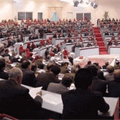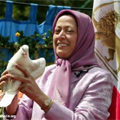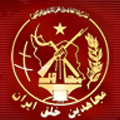

  |
| Navigation
Menu |
*
A glimpse at the life of Maryam Rajavi Rajavi began her activities during the anti-shah movement in early 1970s, as one of the leaders of the student movement while studying at the University. The Shah's regime executed one of her sisters, Narges, and the Khomeini regime murdered another, Massoumeh, who died under torture in 1982 while eight months pregnant. Massoumeh's husband, Massoud Izadkhah, was also executed. After the 1979 Revolution, Rajavi became a leading figure in the Social Section of the People's Mojahedin Organization of Iran (PMOI), and played an important role in recruiting university and high school students into the ranks of the movement. At the time, the PMOI quickly emerged as the principal opposition movement to the clerical regime. In 1980, Rajavi was among candidates for the parliamentary elections in Tehran and received more than a quarter million votes, despite widespread vote fraud by the government. Mrs. Rajavi was involved in organizing peaceful demonstrations in Tehran in April and June 1981 in protest against the government's increasingly repressive policies. When half-a-million Mojahedin supporters marched peacefully in Tehran on June 20, 1981, to demand respect for freedoms, Khomeini unleashed his reign of terror. Hundreds were killed or wounded and thousands arrested on that day. In 1982, Rajavi left Iran for France. In Paris, she quickly emerged as the most capable and qualified woman in the movement and was eventually elected as the PMOI's Joint-Leader in 1985. Four years later, during a plenary session of the PMOI's Congress in 1989, Rajavi was elected as the Organization's Secretary General.
In this capacity, Rajavi directed the Resistance's campaign on the international scene, leading a worldwide effort to expose human rights violations in Iran, Tehran's export of terrorism and fundamentalism and its bid to acquire nuclear weapons. She also worked to inform the world community about the objectives of the Iranian Resistance on a variety of issues. As a Muslim woman, Rajavi presented a formidable political, social, cultural and ideological challenge in her new position as the President-elect to the misogynist mullahs who invoked God to justify their actions. In Maryam Rajavi, the fundamentalist mullahs saw a leader who represented everything they held in contempt.
Rajavi's election gave Iran's oppressed society, especially women, new hopes for a better future. Equally profound and inspiring was the impact of her election on Iranians living abroad. Iranians across the political spectrum rallied to her support and she became a true symbol of national unity against the religious tyranny in Iran. Many delegations from the four-million-strong Iranian exile community, among them Iranian professionals, academics and artists, came to meet her. Rajavi has given extensive lectures on tahe modern, democratic version of Islam versus the reactionary, fundamentalist interpretation of the religion. For her, the most prominent distinction between these two diametrically opposed viewpoints is the issue of women. She also paid special attention to Iran's rich, but endangered, artistic and cultural heritage. Many famous performers, filmmakers, artists, painters, sculptors, poets and writers expressed their support for her platform for a free and secular Iran. *
Charting the future Rajavi also rejected the Iranian mullahs' manipulation of Islam. "Let there be no doubt," she said, "that the peddlers of religion who rule Iran in the name of Islam, but shed blood, suppress the people and advocate export of fundamentalism and terrorism, are themselves the worst enemies of Islam and Muslims. The day will come when they will be forced to let go of the name of Islam." In the past decade, Rajavi has been invited by parliamentarians in different European countries. She visited Great Britain, Norway and the European Parliament, where she addressed groups of parliament deputies and met many political dignitaries to discuss her views on Islam and the future of Iran. Rajavi has a 22-year-old daughter named Ashraf. |
Links __________________ National Council of Resistance of Iran ( NCRI ) Website 
Maryam Rajavi's Website 
Mojahedin-e-Khalq MeK Website 
|